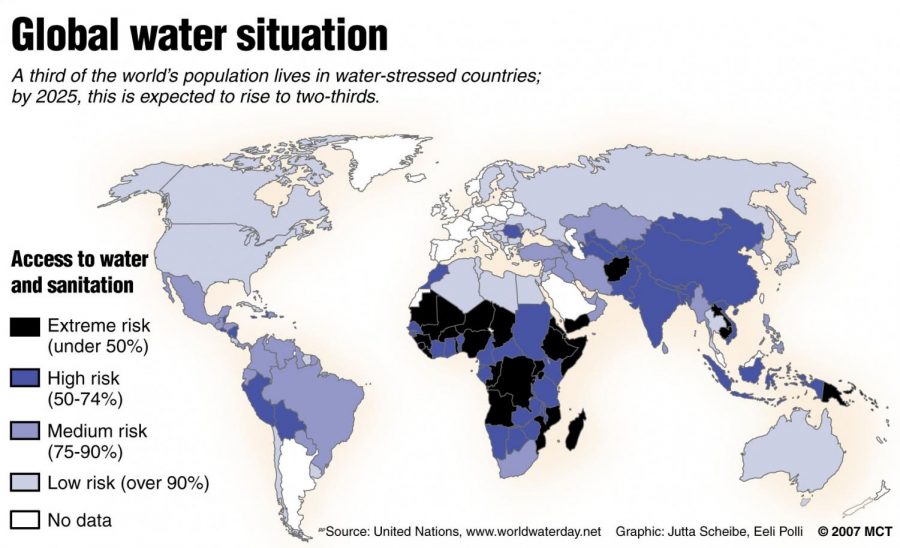A Brewing Storm on the Horizon; Water Shortages
Water; a basic human necessity that most people take for granted, is an essential that is being drained right before our eyes. With 71 percent of the earth being covered by water, only 0.03 percent is usable, a number that is dropping at an accelerated rate, it brings up the question as to why the majority of the world population is ignoring such a crucial issue.
California, USA, Mumbai. India, Cape Town, South Africa, and other areas alike have been faced with severe water shortages caused in part by an extreme drought, over development, population growth, climate change and lack of adequate water preservation systems. These issues’ effects on other cities and nations worldwide have brought up the question as to whether water crises may be a threat in years to come for other locations globally.
Americans may find it difficult to think about a current water crisis occurring in the United States, but in reality, water sources across the US are drying in front of our eyes, as are other sources in almost every continent.
According to The Water Project, an international organization raising awareness about water scarcity, many rivers such as the Colorado River and Lake Mead (Arizona) are predicted to be completely dried by 2021. As reported on their website, “Water scarcity is not just an issue for those who ‘never had.’ It is a problem that faces people where water seemed abundant. Pollution, demand and other factors are ushering in these new problems.”
Ongoing water crises have also generated speculation about future water shortages. Most people do not realize how important something is until it is gone, and in this case, water is a necessity to live. With more and more places universally experiencing water scarcity, retrieving fresh water (or any water in general) in deficit situations, is declining rapidly.
According to the United Nations Department of Economic and Social Affairs website, “Water scarcity already affects every continent. Around 1.2 billion people, or almost one-fifth of the world’s population, live in areas of physical scarcity, and 500 million people are approaching this situation. Another 1.6 billion people, or almost one quarter of the world’s
population, face economic water shortage (where countries lack the necessary infrastructure to take water from rivers and aquifers).”
The United Nations identifying water scarcity as a problem, shows that it is sweeping every continent at an alarming rate. It seems to be overlooked by almost everyone, from common people to politicians and world leaders. But a lack of water is an obstacle that affects the world in scale even greater than thought by most people. Water deficits cause rising problems in health, sanitation, education and economy, as many people faced with water crises spend time trying to seek and gain access to water often miss out on opportunities to better their lives.
What causes this severe issue? Contributing factors of world water shortages are climate change, population growth, pollution and current methods/waste of water usages and cultivations, such as agriculture and factories.
According to Circle of Blue, an organization that focuses on global water crises, experts from around the world are joining together to create solutions for current and future water shortages. These solutions will only work if everyone does their part in preventing crises.
What can you do to help? Educate yourself and others on water scarcity and climate change, using/wasting less water, using less electricity and other preventive measures can be taken by every day to lower the risk of water shortages.






